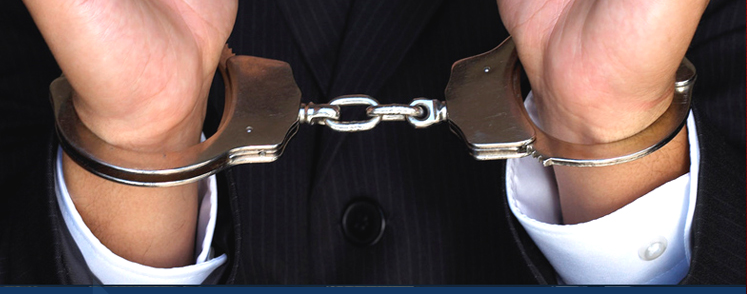White Collar Crimes
The nature of white collar offenses is usually thought to be crimes of a non-violent nature. Usually, a person is accused of being motivated strictly by financial or personal gain. While bribery and embezzlement have occurred before the first documented case in 15th century Englandin the past, this type of criminal offense did not become as widespread until fairly recently. The public has grown enraged by the necessity of paying outrageously high prices attributed in the media to corporate greed, and so government intervention has occurred, thus making such practices illegal and often subject to close media scrutiny.
While the generalization that most crimes such as fraud, tax evasion, insider stock market trading, embezzlement, bribery, cheating, environmental law violations, money laundering, intellectual property fraud, antitrust violations or organized crime — which doesn’t include acts of violence — are committed by executive types and professionals, this is not always the case. Business executives wearing white shirts and ties are no longer the only perpetrators of white collar crimes. Regardless of who is charged, it is always a serious matter. A criminal charge, much less a conviction, can ruin your reputation and shatter your life. The Law Offices of Carl David Ceder, PLLC is highly experienced in all areas of white collar crime and will work aggressively to minimize the damage to your life.
How Serious Is It?
White collar crime is generallly not considered as serious as other offenses, although this is simply incorrect. The possible consequences of such charges and the ranges of punishment can be extensive in the form of monetary fines, lengthy prison sentences, or a combination of both. Often federal agencies get involved, no doubt making the situation more complex and serious.
While the criminal punishments can be severe for white collar criminal offenses, defendants usually have little to not criminal history and this can be taken into account. If you have no significant criminal record, you could be sentenced to probation, a suspended jail sentence, and ordered to pay restitution to the victim. Aside from the devastating criminal penalties, you could also be subject to a civil lawsuit, brought by federal or state government or by the victims of the offense. The social and employment consequences of a conviction can be nearly as devastating as the criminal penalties. Because white collar crimes typically involve some sort of deceit or dishonesty, many employers will be reluctant to give you a job based on the nature of the charges. You may be prohibited from obtaining a professional license, or possibly even lose a license you already possess due to the nature of the conviction as a crime of moral turpitude.
It is imperative to consult with an attorney immediately when you believe you may be the subject of an investigation for ANY white collar criminal offense. The Law Offices of Carl David Ceder, PLLC has handled many types of white collar criminal cases, including mortgage fraud, tax evasion, and misuse of a fidiciary duty. The evidence in these cases is often overwhelming and complex. It is crucial, therefore, to only entrust your case to someone that will spend the time to examine all facts of the case to ensure your rights are fully protected. Carl will determine if the evidence against you is questionable and can be challenged in court, and will do everything in his power to expose any weakness in the state's case.
Fraud
There are a large number of crimes which fall under the category of fraud as a white collar criminal offense, including: credit card fraud, investment fraud, bank fraud, insurance fraud, internet fraud, mortgage fraud, tax fraud, franchise fraud, land fraud, mail fraud, contribution fraud, environmental fraud, computer fraud, welfare fraud, and auto insurance fraud. In the broadest sense, fraud can be defined as intentional deception made in an attempt to either damage another individual or for some other type of personal gain. Under the legal jurisdiction, fraud is both a crime and a civil law violation which defrauds people or entities out of money or valuables. Most courts will require that each of the elements of fraud be proven with very convincing and compelling evidence.
Check Forgery/Credit Card Fraud
Check forgery consists of stealing an unsigned check from someone else with the intent of using it, of simply by filling in, signing and passing a check that does not belong to you, without the owner’s permission. Accepting a check you knew was stolen is also considered fraud under Texas law. Using a credit card or debit card that you know has been canceled, expired, or belongs to someone else, is considered credit card fraud and will usually be prosecuted. Even convincing someone else to buy something with a credit/debit card when you are aware they don’t have the money to pay for it can be considered credit card fraud. The investigator to the case will rely on documented evidence when charging you with check fraud or credit card fraud, such as signed checks, credit card receipts, credit applications, witnesses to the financial transaction, and even the hard drive on your computer if the fraud was alleged to have been committed online.
Credit Fraud
Credit fraud consists of lying in any way on a written application for a loan, credit card, goods or property, and includes passing off another’s Social Security number as your own, giving a fake name and address, or misrepresenting your income or ability to pay. Identity theft, or fraud, encompasses obtaining, possessing or using the personal identity information of another with the intent to commit fraud. Texas criminal law automatically presumes your intent was to commit fraud if you possess personal identification information on three or more people.
Texas Penalties for Fraud
Check forgery in Texas is a state jail felony, and stealing or receiving a stolen check is a Class A misdemeanor, while credit card fraud is a state jail felony which is punishable with a punishment sentence of up to two years in a Texas state jail. Credit fraud penalties vary depending on the amount of money involved, and identity theft penalties vary by the number of identification items found in possession, can be filed as a 1st degree felony if the number is over fifty. If you are convicted of identity theft, the judge can order you to pay restitution to the victims, including lost income or expenses they may have incurred while trying to resolve the situation.
Consult an Attorney
A fraud conviction can potentially affect the rest of your life, most likely prohibiting you from obtaining certain jobs. The Law Offices of Carl David Ceder, PLLC, will try and aggressively fight your fraud charges in a variety of ways, including challenging witness statements or documents if you have grounds to argue they are mistaken or the document is inaccurate. The crux of the case most often centers around the State’s burden to prove you acted with criminal intent. Fraud charges, and the potential penalties are very serious — call The Law Offices of Carl David Ceder, PLLC to have a highly trained advocate in your corner to help DEFEND YOUR RIGHTS!







































